#CruiseAndFerryDataScraping
Explore tagged Tumblr posts
Text
Top 10 Most Scraped Travel Platforms In Global Travel
Explore the business impact of the Most Scraped Travel Platforms as travel companies leverage data to enhance pricing, listings, & customer engagement at scale.
#OTADataScraping#AirlineDataScraping#VacationRentalDataScraping#HotelDataScraping#CruiseAndFerryDataScraping#TravelAggregatorDataScraping#TravelDataIntelligence#TravelAggregators#TravelIndustryWebScraping
0 notes
Text
Top Travel Data Sources Scraped By Global Travel Brands
Introduction
The travel industry has evolved significantly, with data now serving as the cornerstone of strategic growth and competitive positioning. Global travel brands adopt advanced data extraction methods to stay agile and informed in a rapidly shifting market. By analyzing Top Travel Data Sources, industry leaders uncover actionable insights that enhance business performance, improve planning, and shape the future of travel operations through intelligent, data-driven strategies.
The Evolution of Travel Data Intelligence

Modern travel businesses operate in an environment where information is power. Accessing, analyzing, and acting upon real-time market data has become crucial for survival and growth. Travel Data Intelligence has emerged as a critical component that enables companies to understand market trends, consumer behavior, and competitive landscapes with unprecedented precision.
The travel sector generates enormous amounts of data daily through various touchpoints, including booking platforms, customer reviews, pricing fluctuations, and availability changes. Industry leaders have recognized that sophisticated Vacation Rental Data Scraping techniques allow them to harness this information effectively, transforming raw data into actionable business intelligence.
Companies that successfully implement comprehensive data collection strategies often experience the following:
Enhanced pricing optimization capabilities.
Improved inventory management.
Better customer targeting and personalization.
More accurate demand forecasting.
Competitive advantage through market intelligence.
Strategic Approaches to Aviation Data Collection
The aviation sector represents one of the most dynamic and data-rich segments within the travel industry. Understanding flight pricing patterns, route availability, and market demand fluctuations has become essential for travel companies seeking competitive advantages. Hotel Data Scraping methodologies often complement aviation data collection, providing comprehensive insights across multiple travel segments.
Airlines continuously adjust their pricing based on various factors, including demand, seasonality, fuel costs, and competitive pressures. By implementing Leading Travel Brands Data Scraping techniques, travel companies can monitor these price changes in real time, enabling them to offer competitive packages and optimize their revenue streams.
The aviation data collection process typically involves:
Real-time flight price monitoring across multiple carriers.
Seat availability tracking for different booking classes.
Route popularity analysis and demand forecasting.
Seasonal trend identification for better planning.
Competitive pricing intelligence gathering.
Hospitality Sector Data Extraction Methods
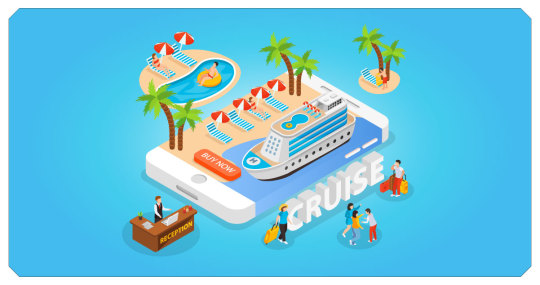
The hospitality industry presents unique challenges and opportunities for data collection. Comprehensive accommodation data has become increasingly valuable as leading brands recognize its strategic importance. This practice enables travel companies to understand pricing strategies, availability patterns, and market positioning across hospitality segments.
Successful hospitality data operations focus on gathering diverse data points that provide holistic market insights. Cruise And Ferry Data Scraping techniques share similar methodologies with hotel data collection, requiring sophisticated approaches to handle complex pricing structures. These include room rates, availability calendars, amenity offerings, guest reviews, and location-based information.
The hospitality data landscape encompasses:
Dynamic pricing models across different property types.
Seasonal demand patterns and booking trends.
Guest satisfaction metrics and review analysis.
Amenity offerings and service quality indicators.
Location-based performance metrics and market share data.
Online Travel Agency Data Collection Strategies
Online Travel Agencies (OTAs) are comprehensive platforms aggregating travel services from multiple providers. Understanding market dynamics, pricing strategies, and consumer preferences across the digital travel ecosystem has become essential for leading brands. Airline Data Scraping practices often integrate with OTA analysis to provide complete market visibility.
The complexity of OTA data collection lies in the diverse range of services these platforms offer, from flights and hotels to car rentals and activities. Successful data collection strategies must account for this diversity while maintaining accuracy and relevance. Market Insights From Travel Data obtained through OTA analysis often reveal broader industry trends and consumer behavior patterns.
Key components of effective OTA data collection include:
Package deal pricing and bundling strategies.
Cross-selling and upselling technique analysis.
Customer review sentiment and satisfaction metrics.
Booking flow optimization and conversion tracking.
Marketing campaign effectiveness and promotional impact.
Alternative Accommodation Data Mining
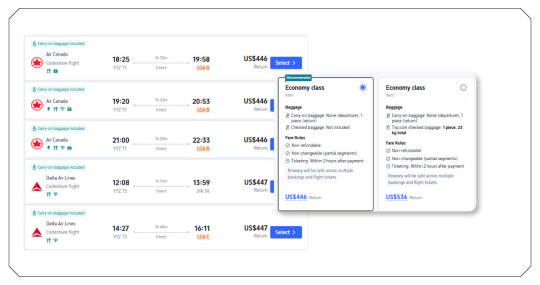
The rise of alternative accommodation options has created new data collection and analysis opportunities. Platform growth in vacation rentals has become increasingly important as companies like Airbnb and VRBO expand their market share. Travel Aggregator Data Scraping methodologies often include vacation rental platforms to provide comprehensive market coverage.
This specialized data collection involves gathering information about property listings, pricing structures, availability patterns, and guest reviews. OTA Data Scraping techniques complement vacation rental analysis by providing comparative insights across traditional and alternative accommodation sectors. The information gathered often reveals pricing elasticity and demand patterns that differ significantly from conventional hospitality models.
The vacation rental data ecosystem includes the following:
Property type preferences and geographic distribution.
Pricing strategies for different property categories.
Seasonal demand fluctuations and booking patterns.
Host behavior and property management practices.
Guest experience metrics and satisfaction indicators.
Maritime Travel Data Collection
The maritime travel sector, including cruises and ferry services, represents a specialized but significant travel industry segment. This unique segment requires distinct approaches due to the characteristics of maritime travel, including longer booking windows, seasonal operations, and capacity constraints.
Effective maritime data collection focuses on understanding cabin availability, pricing tiers, route popularity, and seasonal demand patterns. Leading Travel Brands Data Scraping strategies often incorporate maritime data to provide comprehensive travel market intelligence. This information helps travel companies optimize their maritime offerings and identify partnership opportunities.
Maritime travel data collection encompasses:
Cabin category pricing and availability tracking.
Route performance and seasonal demand analysis.
Package inclusions and value proposition assessment.
Customer demographic and preference analysis.
Port popularity and destination trend identification.
Travel Aggregator Intelligence Systems
Travel aggregators play a crucial role in the modern travel ecosystem by consolidating information from multiple sources and understanding how these platforms organize and present travel information, which provides insights into market positioning and competitive strategies. Vacation Rental Data Scraping often integrates with aggregator analysis to understand how alternative accommodations are positioned across different platforms.
Aggregator data analysis examines how platforms categorize, price, and present travel options. This analysis helps travel companies understand market positioning and identify opportunities for improved visibility and competitive advantage. Top Travel Data Sources analysis from aggregator intelligence often reveals broader market trends and consumer behavior patterns.
Aggregator intelligence systems typically monitor:
Search result ranking algorithms and visibility factors.
Price comparison methodologies and accuracy.
Content presentation and user experience optimization.
Market share distribution across different platforms.
Consumer preference indicators and booking behavior.
Transforming Data into Strategic Advantages
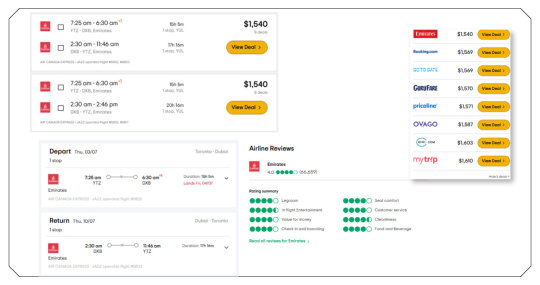
Travel data collection forms the foundation of a broader intelligence strategy. Leading travel brands use advanced analytics and Airline Data Scraping to turn raw information into insights that reveal trends, highlight patterns, and support data-driven decisions for business growth.
Data transformation empowers companies to make more innovative product development, marketing, and operations decisions. Combining Hotel Data Scraping with broader insights offers complete market visibility, helping anticipate demand shifts, spot new travel trends, and analyze consumer behavior for a competitive edge.
Successful data transformation strategies include:
Predictive analytics for demand forecasting.
Competitive intelligence and market positioning analysis.
Customer segmentation and personalization strategies.
Pricing optimization and revenue management.
Risk assessment and market volatility monitoring.
Implementation Strategies for Data-Driven Growth
Successful implementation of travel data collection strategies requires careful planning and execution. Leading brands typically follow structured approaches that ensure data quality, compliance, and strategic alignment. Travel Data Intelligence systems require robust implementation frameworks for technical, legal, and operational considerations.
The implementation process involves selecting appropriate data sources, establishing collection protocols, and developing analysis frameworks. OTA Data Scraping initiatives often serve as pilot programs that test methodologies and validate data quality before broader implementation. These programs help organizations understand technical requirements and resource allocation needs.
Key implementation considerations include:
Data quality assurance and validation processes.
Technical infrastructure requirements and scalability.
Compliance with legal and ethical guidelines.
Resource allocation and team structure planning.
Performance monitoring and optimization strategies.
Future Trends in Travel Data Collection
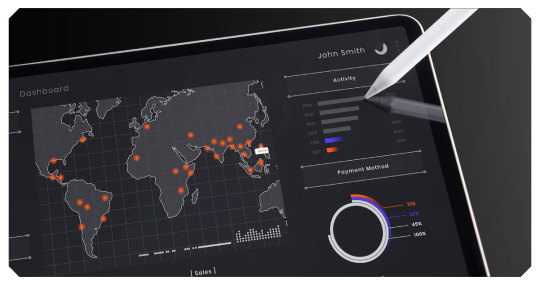
The travel industry continues to evolve rapidly, with new technologies and platforms creating additional data collection and analysis opportunities. Emerging trends include artificial intelligence integration, mobile-first data strategies, and enhanced personalization capabilities. Cruise And Ferry Data Scraping methodologies are adapting to incorporate these technological advances.
Data intelligence systems are becoming increasingly sophisticated, incorporating machine learning algorithms and predictive analytics capabilities. These advancements enable more accurate forecasting and better strategic decision-making. Market Insights From Travel Data integration across multiple sources creates comprehensive market intelligence that supports growth initiatives.
Future developments in travel data collection will likely include:
Enhanced mobile data collection capabilities.
Artificial intelligence-powered analysis tools.
Real-time personalization and dynamic pricing.
Integrated social media and sentiment analysis.
Blockchain-based data verification systems.
How Travel Scrape Can Help You?
We specialize in providing comprehensive data collection solutions tailored to the unique needs of travel industry professionals. Our expertise in diverse travel information sources enables clients to access the information they need for strategic decision-making and business growth.
Comprehensive Data Collection: We provide access to diverse travel data sources, including airlines, hotels, OTAs, vacation rentals, and cruise operators across Top Travel Data Sources.
Real-Time Monitoring: Our systems deliver up-to-date information on pricing, availability, and market trends through advanced Travel Aggregator Data Scraping capabilities.
Customized Solutions: We tailor our data collection strategies to meet specific business requirements and industry segments.
Advanced Analytics: Our platform transforms raw data into actionable insights through sophisticated analysis and reporting tools.
Compliance and Ethics: We ensure all data collection activities adhere to industry standards and ethical guidelines.
Scalable Infrastructure: Our technology can handle large-scale data collection operations while maintaining accuracy and reliability.
Expert Support: Our team provides ongoing consultation and technical support to maximize the value of collected data.
Conclusion
The strategic use of Top Travel Data Sources is now a cornerstone for success in the travel sector. With accurate data collection and analysis, companies gain a clear edge in pricing, marketing, and operations. Access to detailed travel data empowers smarter decisions and sustainable growth.
As the industry evolves, data-driven strategies grow more critical. Platforms like Travel Aggregators are key in delivering insights that shape more innovative strategies and agile responses.
Read More :- https://www.travelscrape.com/top-travel-data-sources-scraped.php
#ScrapeTopTravelDataSourcesForTravel#AdvancedDataExtraction#VacationRentalDataScraping#HotelDataScraping#CruiseAndFerryDataScraping#AirlineDataScraping#TravelAggregatorDataScraping#OTADataScraping#TravelDataIntelligence#TravelAggregators
0 notes
Text

Top Travel Data Sources Scraped By Global Travel Brands
Explore Top Travel Data Sources industry leaders use to enhance marketing strategies, optimize travel deals, and analyze real-time demand patterns.
Read More :- https://www.travelscrape.com/top-travel-data-sources-scraped.php
#ScrapeTopTravelDataSourcesForTravel#AdvancedDataExtraction#VacationRentalDataScraping#HotelDataScraping#CruiseAndFerryDataScraping#AirlineDataScraping#TravelAggregatorDataScraping#OTADataScraping#TravelDataIntelligence#TravelAggregators
0 notes
Text
Top Travel Data Sources Scraped By Global Travel Brands
Explore Top Travel Data Sources industry leaders use to enhance marketing strategies, optimize travel deals, and analyze real-time demand patterns.
Read More :- https://www.travelscrape.com/top-travel-data-sources-scraped.php
#ScrapeTopTravelDataSourcesForTravel#AdvancedDataExtraction#VacationRentalDataScraping#HotelDataScraping#CruiseAndFerryDataScraping#AirlineDataScraping#TravelAggregatorDataScraping#OTADataScraping#TravelDataIntelligence#TravelAggregators
0 notes
Text

Real-Time Travel Fare Scraping Grew Cruise Line Revenue
Discover the impact of Real-Time Travel Fare Scraping in boosting cruise bookings by 22% through dynamic pricing, data-driven insights, and smarter decisions.
Read More :- https://www.travelscrape.com/travel-scraping-boosts-cruise-sales.php
#CruiseAndFerryDataScraping#CruisePricingIntelligence#GlobalCruiseRouteDataset#GlobalFerryRouteDataset
0 notes
Text
Real-Time Travel Fare Scraping Grew Cruise Line Revenue
Introduction
As the cruise industry evolves rapidly, operators face challenges crafting fare strategies that balance revenue growth with passenger satisfaction. Real-Time Travel Fare Scraping has emerged as a vital tool for maritime brands aiming to boost bookings and maintain competitive advantage. With over 15 million cruise bookings processed annually on global platforms, relying on outdated pricing methods or surface-level competitor tracking is no longer effective. Leading cruise operators now harness Cruise Data Analytics to build more innovative, dynamic revenue systems.
This case study explores how our partner, a leading cruise line operator, leveraged Cruise And Ferry Data Scraping and predictive analytics to transform their fare strategy. By implementing our advanced market intelligence platform, they significantly improved booking rates, passenger revenue, and overall profitability.
Our Client
Neptune Crown Cruises operates an exclusive collection of 15 luxury cruise vessels across premier destinations spanning the Mediterranean, Baltic, and Alaska routes. Although providing outstanding guest experiences, their booking portfolio experienced challenges, with conversion rates averaging only 42%, significantly below industry standards. This performance shortfall demonstrated their critical requirement for Maritime Travel Data solutions to accelerate revenue expansion.
Their previous fare methodology depended extensively on seasonal trends and elementary market analysis through periodic competitor research. Without sophisticated Custom Travel Data Solutions infrastructure, the management team lacked a comprehensive understanding of essential market variables, including dynamic demand fluctuations, competitor fare modifications, and evolving consumer preferences.
Understanding that conventional pricing methodologies constrain their growth potential, Neptune Crown partnered with Travel Scrape to establish a comprehensive, analytics-driven strategy. This transformation enabled intelligent decision-making processes and generated measurable performance gains across their vessel fleet.
Challenges in Contemporary Maritime Industry
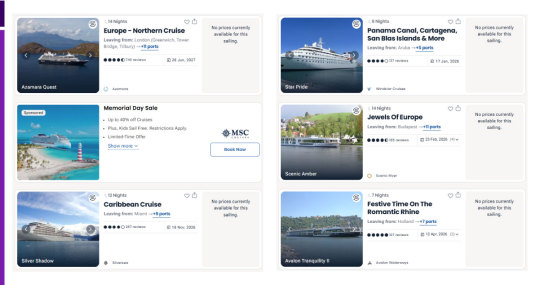
The cruise sector confronts increasingly sophisticated fare management obstacles demanding advanced analytics capabilities:
● Intelligence Insight Gap
Cruise operators face limited market clarity due to the absence of comprehensive Cruise Pricing Intelligence, risking fare misjudgment and revenue loss across all seasonal booking cycles.
● Tracking Forecast Strain
Lack of robust analytics hinders accurate Real-Time Cruise Fare Tracking, making demand forecasting difficult and weakening pricing agility amid evolving booking behaviors and passenger trends.
● Visibility Strategy Struggle
With platforms shifting algorithms, adopting a strong Dynamic Cruise Pricing Strategy is vital to sustain visibility and maximize bookings via optimized digital fare placements.
● Automation Lag Impact
Without automated Web Scraping Cruise Ota Platforms, operations suffer delays in pricing updates, reducing workflow efficiency and limiting strategic focus on service quality and growth.
Our Approach

We empowered Neptune Crown with robust market intelligence using a data-driven approach that combines machine learning and automation.
● Cruise Intelligence Core
Integrates diverse data via Cruise And Ferry Data Scraping, delivering real-time fare monitoring, route insights, and booking behavior visualization for strategic market decisions.
● Smart Fare Engine
Driven by Ticket Pricing Optimization, this AI-powered tool recommends adaptive pricing based on historical trends and real-time data to improve occupancy and maximize cruise revenue.
● Insight Sync Board
Using Ferry Schedule Scraping intelligence, this dashboard continuously evaluates pricing strategies, tracks performance shifts, and ensures alignment with evolving market dynamics and demand patterns.
● Seamless Sync Hub
This automated platform uses our cruise industry API to integrate booking systems, eliminating manual input and enabling real-time, ongoing synchronization of vital market data.
● Demand Pulse Model
Built on the Global Cruise Route Dataset , this model predicts booking trends 120 days ahead, empowering operators to anticipate peak periods and optimize premium pricing.
Results Achieved

Powered by deep Global Ferry Route Dataset insights, our tailored solution significantly boosted Neptune Crown's cruise operations:
● Booking Surge Strategy
Booking Performance Enhancement drove conversions from 42% to 64%, boosting revenue through sharper passenger acquisition and efficient booking during low-demand travel periods.
● Revenue Growth Mastery
Revenue Expansion Success used data-driven pricing and positioning to grow annual reservations by 22% and average booking value by 29%, strengthening competitive revenue performance.
● Efficiency Automation Boost
Operational Efficiency Gains via Cruise Data Analytics cut manual pricing tasks by 84%, reallocating resources to guest service enhancements and fleet growth for better performance.
● Seasonal Fare Maximizer
Seasonal Revenue Optimization identified 41 premium demand periods, applying smart pricing to reach 91% utilization during peak windows, driving profit in strategic timeframes.
● Platform Visibility Lift
Digital Platform Performance leveraged Maritime Travel Data and dynamic pricing, increasing cruise listing visibility by 73% and raising organic bookings and brand presence online.
Client's Testimonial
"The Real-Time Travel Fare Scraping platform from Travel Scrape has revolutionized our revenue management approach. With comprehensive market analytics and Custom Travel Data Solutions , we've transformed our pricing across all routes and seasons, achieving remarkable growth in bookings and profitability. This technology partnership has established our competitive advantage in the modern cruise marketplace."
– David Martinez, Chief Revenue Officer, Neptune Crown Cruises
Conclusion
Embracing advanced Real-Time Travel Fare Scraping solutions represents a strategic transformation in how successful cruise operators manage revenue optimization within today's competitive environment. By utilizing comprehensive data from major Travel Aggregates, cruise lines can execute informed strategies that maximize passenger volume and revenue generation.
Implementing sophisticated Travel Industry Web Scraping technologies provides cruise operators with accurate, actionable market intelligence that supports strategic pricing decisions and delivers quantifiable performance improvements throughout their business portfolios.
Contact Travel Scrape for a personalized strategy session and learn how our specialized market analytics can revolutionize your pricing approach, strengthen your competitive position, and generate significant increases in cruise reservations.
Read More :- https://www.travelscrape.com/travel-scraping-boosts-cruise-sales.php
#CruiseAndFerryDataScraping#CruisePricingIntelligence#GlobalCruiseRouteDataset#GlobalFerryRouteDataset
0 notes
Text
Real-Time Travel Fare Scraping Grew Cruise Line Revenue
Discover the impact of Real-Time Travel Fare Scraping in boosting cruise bookings by 22% through dynamic pricing, data-driven insights, and smarter decisions.
Read More :- https://www.travelscrape.com/travel-scraping-boosts-cruise-sales.php
#CruiseAndFerryDataScraping#CruisePricingIntelligence#GlobalCruiseRouteDataset#GlobalFerryRouteDataset
0 notes
Text
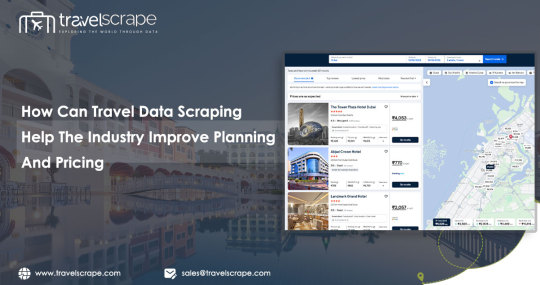
Travel Data Scraping Benefits For The Modern Travel Industry
Discover the key benefits of Travel Data Scraping for enhancing pricing strategies, competitor insights, and customer personalization in the travel industry.
Read More :- https://www.travelscrape.com/modern-travel-industry-data-scraping-benefits.php
#TravelDataScraping#HotelDataScraping#CarRentalDataScraping#VacationRentalDataScraping#CruiseAndFerryDataScraping#TourAndTravelPackageDataScraping#TravelIndustryDataExtraction#OTAAndMetaSearchScraping#TravelIndustryWebScraping#TravelAggregators
0 notes
Text
Travel Data Scraping Benefits For The Modern Travel Industry
Introduction
The modern travel landscape has transformed dramatically, with digital platforms becoming the primary gateway for travelers seeking the best deals and experiences. In this competitive environment, businesses must leverage every available tool to stay ahead. Implementing Travel Data Scraping techniques has emerged as a game-changing strategy that enables companies to make informed decisions, optimize pricing structures, and enhance overall business planning.
Today's travelers expect transparency, competitive pricing, and personalized experiences. Meeting these expectations requires access to comprehensive market intelligence that traditional data collection methods cannot provide. Advanced Travel Industry Data Extraction processes offer travel companies the competitive edge they need to thrive in an increasingly saturated market.
Understanding the Current Travel Market Dynamics

The travel industry operates in a complex ecosystem where prices fluctuate constantly based on demand patterns, seasonal variations, competitor strategies, and external factors. Traditional market research methods often lag behind real-time market changes, leaving businesses with outdated information that can lead to poor strategic decisions. Modern Airline Data Scraping methodologies enable businesses to capture real-time pricing intelligence across multiple carriers and routes simultaneously.
Modern travelers utilize multiple platforms before booking, comparing prices across various channels and reading reviews from different sources. This behavior creates a vast digital footprint of valuable information that can provide unprecedented insights into market trends and consumer preferences through sophisticated Hotel Data Scraping techniques when properly collected and analyzed.
Companies can monitor competitor pricing strategies, track market demand patterns, and identify emerging trends that might go unnoticed. The volatility of travel pricing makes real-time data collection essential for maintaining competitive positioning. Airlines adjust their fares multiple times daily, hotels modify rates based on occupancy levels, and car rental companies fluctuate prices based on local demand conditions that require continuous Car Rental Data Scraping monitoring.
Key Benefits of Data-Driven Travel Intelligence
Data-driven travel intelligence strategically uses real-time, structured data to inform pricing, marketing, and operational decisions across the travel ecosystem, helping businesses stay competitive, responsive, and customer-focused.
1. Enhanced Pricing Strategy Development
Implementing sophisticated data collection methodologies allows companies to monitor competitor pricing across multiple routes and periods. This intelligence enables dynamic pricing strategies that respond to real-time market conditions, maximizing revenue while maintaining competitive positioning through comprehensive Vacation Rental Data Scraping analysis.
Airlines can track fare changes across different booking classes, identify pricing patterns during peak and off-peak periods, and adjust pricing strategies accordingly. Monitoring thousands of routes simultaneously provides insights that would be impossible to gather through manual research using traditional Travel Data Intelligence systems.
By monitoring room rates across different property types, locations, and amenities, hotels can optimize their pricing strategies to capture maximum market share while maintaining profitability. This comprehensive approach enables strategic positioning that maximizes revenue potential.
Real-time competitor rate monitoring across multiple channels
Seasonal pricing pattern identification and analysis
Dynamic pricing optimization based on market conditions
Revenue management strategy enhancement through comprehensive market data
2. Comprehensive Market Research and Analysis
Implementing systematic data collection processes provides valuable insights into ground transportation market dynamics. Companies can monitor fleet availability, pricing strategies, and service offerings across locations and periods while utilizing OTA And Meta Search Scraping techniques to gather comprehensive market intelligence.
Understanding market demand patterns helps businesses optimize fleet deployment, adjust pricing strategies, and identify expansion opportunities. The ability to track competitor performance across multiple markets enables strategic positioning that maximizes market share and profitability through advanced analytics capabilities.
Property management companies can monitor listing performance, analyze amenity preferences, and identify pricing trends that inform investment and development decisions. This comprehensive approach to market analysis provides the foundation for strategic decision-making across all travel sectors.
Competitor performance analysis and benchmarking
Market demand forecasting and trend identification
Service gap analysis and opportunity identification
Customer preference mapping and segmentation analysis
Advanced Planning Through Comprehensive Data Intelligence

Empowers travel businesses with actionable insights by leveraging large-scale data sources for proactive decision-making, enabling strategic forecasting, optimized operations, and a competitive edge in dynamic markets.
1. Route and Destination Planning Optimization
Advanced intelligence systems enable airlines and travel agencies to identify emerging destination trends before they become mainstream. By analyzing search patterns, booking behaviors, and social media mentions, companies can anticipate demand shifts and adjust their service offerings using sophisticated Cruise And Ferry Data Scraping methodologies.
This proactive approach to market intelligence allows businesses to secure strategic partnerships, negotiate favorable rates, and position themselves advantageously in emerging markets. Predicting demand trends enables more effective capacity planning and resource allocation across different travel segments.
Route planning optimization through data analysis helps airlines identify profitable route opportunities, optimize flight schedules, and improve operational efficiency. Historical performance data and market trend analysis provide the foundation for strategic network planning decisions incorporating Tour And Travel Package Data Scraping insights.
2. Inventory Management and Capacity Planning
Comprehensive data collection processes provide complete visibility into market inventory levels across channels. This intelligence enables better capacity management decisions and helps prevent resource overbooking or underutilization while maintaining competitive pricing strategies.
Travel companies can monitor competitor inventory levels, track booking pace patterns, and adjust their inventory strategies to maximize revenue. Understanding market-wide availability trends helps optimize pricing strategies and promotional timing across all travel segments.
Integrating multiple data sources creates a comprehensive view of market dynamics that supports sophisticated forecasting models. These models enable more accurate demand predictions and better resource allocation decisions across market segments.
Specialized Data Collection Strategies
Advanced data extraction methods tailored to gather intelligence from niche travel segments like maritime and alternative transport, enabling informed decision-making and strategic advantage.
1. Maritime and Alternative Transportation Intelligence
Specialized data collection techniques provide insights into maritime travel markets that traditional travel intelligence systems often overlook. These specialized markets require unique data collection approaches that account for seasonal patterns, route-specific demand, and regulatory considerations while implementing comprehensive Travel Data Scraping methodologies.
Understanding maritime travel patterns helps tour operators create comprehensive vacation packages with water-based transportation options. Monitoring pricing and availability across different cruise lines and ferry operators enhances package development capabilities significantly.
Maritime travel data collection supports strategic planning for companies operating in island destinations or regions where water transportation significantly affects the overall travel experience. This specialized intelligence enables competitive positioning in niche market segments.
2. Package Deal and Tour Optimization
Comprehensive analysis methodologies enable detailed examination of bundled travel offerings across multiple providers. This intelligence supports package optimization strategies that improve profitability while enhancing customer value through advanced Travel Industry Data Extraction processes.
Tour operators can monitor competitor package components, pricing strategies, and seasonal offerings to develop more competitive and attractive packages. Understanding market preferences for different package types helps optimize inventory allocation and marketing strategies across different target demographics.
Analyzing package performance data enables continuous improvement of offering structures and pricing strategies. Companies can identify and replicate successful package combinations across different markets or periods while maintaining competitive advantages.
Technology Implementation and Integration Challenges

Refers to the complexities businesses face when deploying and connecting advanced data scraping systems, ensuring seamless operations across diverse travel platforms while maintaining accuracy, compliance, and efficiency.
1. Data Quality and Accuracy Considerations
Implementing effective data collection systems requires careful attention to data quality and accuracy standards. The volume of information available across travel platforms can be overwhelming, making establishing robust filtering and validation processes incorporating Airline Data Scraping best practices essential.
Quality control measures must account for platform-specific data formats, update frequencies, and potential inconsistencies across different sources. Establishing standardized data collection protocols ensures consistency and reliability in analytical outputs while maintaining data integrity.
Integration challenges often arise when combining data from multiple sources with different update schedules and format requirements. Developing flexible data processing systems that accommodate various input formats while maintaining data integrity is essential for successfully implementing Hotel Data Scraping methodologies.
2. Compliance and Ethical Data Collection
Modern data collection practices must comply with various privacy regulations and platform terms of service. Establishing ethical data collection frameworks ensures long-term sustainability while maintaining legal compliance across different jurisdictions through responsible Car Rental Data Scraping practices.
Responsible data collection practices include respecting platform rate limits, avoiding excessive server loads, and maintaining transparency in data usage. These practices help preserve access to valuable data sources while demonstrating corporate responsibility and ethical business conduct.
Companies must also consider data security and storage requirements when implementing comprehensive data collection systems. Protecting collected information and ensuring secure data handling processes are essential to successful implementation strategies incorporating Vacation Rental Data Scraping protocols.
Market Intelligence and Competitive Analysis
Gain a comprehensive view of market dynamics through real-time competitor insights and customer behavior analytics that drive smarter, faster decisions.
1. Real-Time Competitor Monitoring
Advanced monitoring systems enable continuous tracking of competitor activities across multiple channels and platforms. This comprehensive approach provides insights into pricing strategies, inventory management, and promotional activities that influence market dynamics through sophisticated Travel Data Intelligence applications.
Understanding competitive positioning helps businesses adjust their strategies in real-time, respond to market changes quickly, and maintain competitive advantages. Monitoring competitor performance across different market segments enables strategic positioning that maximizes market share and profitability.
Real-time monitoring capabilities extend beyond simple price tracking to include service offerings, customer reviews, and operational performance metrics. This comprehensive intelligence supports strategic decision-making across all business functions and market segments.
2. Customer Behavior Analysis
Comprehensive data collection enables detailed analysis of customer behavior patterns across different travel segments. Understanding how customers research, compare, and book travel services provides valuable insights for optimizing service offerings and marketing strategies through OTA And Meta Search Scraping techniques.
Customer preference analysis helps businesses tailor their offerings to meet specific market demands and identify emerging trends before competitors. This proactive approach to market intelligence enables strategic positioning that captures maximum market share and customer loyalty.
Integrating customer behavior data with competitive intelligence creates a comprehensive view of market dynamics that supports sophisticated business planning and strategic development initiatives across all travel sectors.
Future Trends and Market Evolution

The travel industry continues to evolve rapidly, with new technologies and changing consumer behaviors creating opportunities and challenges for data-driven businesses. Artificial intelligence and machine learning technologies are increasingly integrated into data analysis processes, enabling more sophisticated predictive capabilities through Tour And Travel Package Data Scraping applications.
Mobile technology adoption continues to drive changes in how travelers research and book their trips. Understanding mobile-specific user behaviors and preferences requires specialized data collection approaches that account for platform-specific features and limitations across different market segments.
How Travel Scrape Can Help You?
We specialize in providing comprehensive data solutions tailored specifically to the travel industry's unique requirements. Our advanced technology platform delivers reliable, accurate, and timely market intelligence that supports strategic decision-making across all travel sectors while incorporating Cruise And Ferry Data Scraping capabilities.
Comprehensive Coverage: Monitor prices and availability across airlines, hotels, car rentals, vacation properties, cruises, and tour packages through integrated data collection systems.
Real-Time Intelligence: Access up-to-the-minute market data that enables dynamic pricing strategies and rapid response to competitive changes.
Customized Solutions: Receive tailored data collection and analysis services for your business requirements and market focus areas.
Advanced Analytics: Benefit from sophisticated analytical tools that transform raw data into actionable business insights and strategic recommendations.
Scalable Infrastructure: Leverage robust technology platforms capable of handling large-scale data collection operations across multiple markets and time zones.
Compliance Expertise: Work with experienced professionals who understand regulatory requirements and maintain ethical data collection practices.
Integration Support: Receive comprehensive technical assistance for integrating collected data into existing business systems and analytical workflows.
Conclusion
The strategic implementation of Travel Data Scraping methodologies has become essential for companies seeking to maintain competitive advantages in today's dynamic travel marketplace. Access to comprehensive market intelligence enables more effective pricing strategies, enhanced planning capabilities, and improved customer satisfaction through better service optimization.
Modern Travel Aggregators rely heavily on sophisticated data collection systems to provide accurate, comprehensive information to their users. Companies that invest in advanced data intelligence capabilities position themselves advantageously for long-term success in an increasingly competitive environment.
Travel Industry Web Scraping represents a fundamental shift toward data-driven decision-making that will continue to shape the industry's evolution. Contact us today to discover how Travel Scrape's comprehensive data solutions can transform your business intelligence capabilities and drive sustainable growth in the competitive travel industry.
Read More :- https://www.travelscrape.com/modern-travel-industry-data-scraping-benefits.php
#TravelDataScraping#HotelDataScraping#CarRentalDataScraping#VacationRentalDataScraping#CruiseAndFerryDataScraping#TourAndTravelPackageDataScraping#TravelIndustryDataExtraction#OTAAndMetaSearchScraping#TravelIndustryWebScraping#TravelAggregators
0 notes
Text
Travel Data Scraping Benefits For The Modern Travel Industry
Discover the key benefits of Travel Data Scraping for enhancing pricing strategies, competitor insights, and customer personalization in the travel industry.
Read More :- https://www.travelscrape.com/modern-travel-industry-data-scraping-benefits.php
#TravelDataScraping#HotelDataScraping#CarRentalDataScraping#VacationRentalDataScraping#CruiseAndFerryDataScraping#TourAndTravelPackageDataScraping#TravelIndustryDataExtraction#OTAAndMetaSearchScraping#TravelIndustryWebScraping#TravelAggregators
0 notes
Text
Cruise Booking Data Scraping Reveals 2025 Travel Trends
Introduction
The cruise industry stands at a pivotal crossroads as we navigate through 2025, with data-driven insights becoming the compass that guides strategic decisions. The maritime tourism sector has transformed dramatically, leveraging advanced analytics to understand passenger preferences, pricing dynamics, and market trends. Cruise Booking Data Scraping emerges as a revolutionary tool that unveils hidden patterns in consumer behavior, enabling industry stakeholders to anticipate future trends and make informed business decisions.
Harnessing the power of data extraction and analysis offers unmatched visibility into cruise market trends. By leveraging Cruise And Ferry Data Scraping, industry professionals can uncover patterns in seasonal demand, track shifting destination preferences, and gain insights that were once out of reach.
The Strategic Importance of Data in Modern Cruise Operations

The cruise industry's recovery and evolution depend heavily on understanding consumer sentiment and booking patterns. Maritime Tourism Data collection has become essential for cruise lines seeking to optimize their operations, pricing strategies, and route planning.
Modern travelers exhibit complex decision-making processes influenced by various factors, including pricing trends, destination popularity, seasonal considerations, and safety protocols. Industry leaders recognize that traditional market research methods are insufficient for capturing the dynamic nature of consumer preferences.
Real-time data collection through scraping technologies provides immediate insights into:
Booking velocity patterns across different seasons.
Price sensitivity variations among different demographic segments.
Destination preference shifts based on global events.
Competitive landscape analysis and market positioning.
Customer satisfaction indicators through review analysis.
Integrating automated data collection systems allows cruise companies to respond swiftly to market changes, adjust pricing strategies dynamically, and develop targeted marketing campaigns that resonate with specific customer segments.
Understanding Consumer Behavior Through Traveler Intent Data
Modern cruise passengers demonstrate sophisticated booking behaviors that require detailed analysis. Traveler Intent Data reveals crucial insights about when customers begin their research, how long they spend evaluating options, and what factors ultimately influence their booking decisions.
This information proves invaluable for cruise lines attempting to optimize their marketing funnels and conversion strategies. Advanced scraping techniques capture behavioral signals across multiple touchpoints in the customer journey.
These insights help identify patterns such as:
Research-to-booking timeline variations by destination.
Price comparison behaviors across different platforms.
Influence of reviews and ratings on booking decisions.
Impact of promotional offers on conversion rates.
Seasonal booking preference patterns.
The analysis of consumer intent data enables cruise companies to predict demand more accurately and allocate resources efficiently. Understanding the decision-making timeline allows strategically timing marketing campaigns and promotional offers to maximize conversion rates.
Travel Recovery 2025: Analyzing Post-Pandemic Trends

The cruise industry's journey toward complete recovery continues to unfold throughout 2025, with data scraping providing critical insights into emerging travel patterns. Travel Recovery 2025 trends indicate significant shifts in consumer preferences, with increased emphasis on health and safety protocols, flexible booking policies, and unique destination experiences.
Data analysis reveals several key recovery indicators:
Health and Safety PrioritizationModern cruise passengers demonstrate a heightened awareness of health and safety measures, with booking data showing clear preferences for cruise lines with comprehensive safety protocols. Scraping technologies help identify which safety features most strongly correlate with booking decisions.
Flexibility DemandThe pandemic fundamentally changed traveler expectations regarding booking flexibility. Data shows increased demand for cancellation-friendly policies and date-change options, influencing how cruise lines structure their booking terms.
Destination DiversificationTravel Recovery 2025 data indicates a growing interest in less crowded, unique destinations as travelers seek authentic experiences away from traditional mass-tourism hotspots.
Leveraging Ferry Data Scraping for Comprehensive Market Intelligence
Integrating Ferry Data Scraping with cruise booking analysis provides a holistic view of maritime transportation preferences. Ferry services often serve as complementary or alternative options to cruise travel, making their data valuable for understanding overall maritime tourism trends.
Ferry booking patterns reveal essential insights about:
Short-distance travel preferences and their impact on cruise market share.
Seasonal variations in maritime transportation demand.
Price sensitivity differences between ferry and cruise passengers.
Route popularity trends that may influence cruise itinerary planning.
This comprehensive approach to maritime data collection enables cruise companies to understand their competitive landscape more thoroughly and identify opportunities for market expansion or service differentiation.
Cruise Price Analysis: Optimizing Revenue Through Data-Driven Strategies
Effective pricing strategies in the cruise industry require sophisticated analysis of multiple variables, including seasonality, demand patterns, competitive positioning, and customer segments. Cruise Price Analysis through automated scraping provides real-time visibility into market pricing dynamics, enabling cruise lines to optimize their revenue management strategies.
Advanced pricing intelligence systems track:
Competitor pricing changes across different cabin categories.
Dynamic pricing effectiveness and revenue impact.
Promotional campaign performance metrics.
Last-minute booking price elasticity.
Geographic pricing variations and their impact on demand.
The ability to monitor pricing across multiple platforms simultaneously provides cruise companies with the intelligence needed to maintain competitive positioning while maximizing profitability.
Ferry Booking Intelligence: Expanding Market Understanding

Ferry Booking Intelligence systems provide valuable context for cruise industry decision-making by revealing transportation preferences and travel patterns that influence cruise booking behavior. Understanding how passengers choose between different maritime transportation options helps cruise companies position their services more effectively.
Key insights from ferry booking data include:
Regional transportation preferences that impact cruise market penetration.
Seasonal demand patterns that may translate to cruise opportunities.
Price point analysis for budget-conscious maritime travelers.
Service quality expectations from maritime transportation experiences.
This intelligence helps cruise companies identify market gaps and develop services that appeal to broader maritime transportation audiences.
Future Of Cruise Industry: Predictions Based on Current Data Trends

Data scraping technologies provide unprecedented visibility into emerging trends that will shape the Future Of Cruise Industry operations.
Current booking patterns and consumer behavior analysis reveal several key trends that will influence industry development:
Technology Integration: Increasing demand for integrated digital experiences, from booking to onboard services, influences how cruise lines invest in technology infrastructure.
Sustainable Tourism Focus: Growing environmental consciousness among travelers drives demand for eco-friendly cruise options and sustainable tourism practices.
Personalization Expectations: Data reveals increasing demand for personalized cruise experiences, from customized itineraries to onboard activities.
Multi-Generational Travel Growth: Booking patterns show the rising popularity of multi-generational cruise vacations, which is influencing cabin design and activity programming decisions.
Real-Time Cruise Data Insights: Enabling Agile Business Decisions
The dynamic cruise industry requires real-time visibility into market conditions and booking trends. Real-Time Cruise Data Insights systems provide immediate access to critical business intelligence, enabling cruise companies to respond quickly to market opportunities and challenges.
Real-time data monitoring capabilities include:
Instant booking velocity tracking across all routes and cabin categories.
Immediate competitor pricing change notifications.
Real-time demand forecasting based on current booking patterns.
Automated alert systems for significant market shifts.
Dynamic inventory optimization recommendations.
This immediate access to actionable intelligence allows cruise companies to make agile business decisions that capitalize on market opportunities and mitigate potential risks.
Cruise Itinerary Scraping: Optimizing Route Planning and Destination Selection
Understanding destination popularity and itinerary preferences requires a comprehensive analysis of booking patterns across different cruise routes. Cruise Itinerary Scraping provides detailed insights into which destinations drive bookings and how itinerary variations impact demand.
Route optimization analysis includes:
Destination popularity rankings are based on booking volume.
Seasonal destination preference variations.
Port-of-call impact on overall itinerary attractiveness.
Duration preference analysis for different market segments.
New destination opportunity identification through trend analysis.
This intelligence enables cruise lines to optimize route planning and develop itineraries that align with consumer preferences while exploring new market opportunities.
Cruise And Ferry Data Scraping: Comprehensive Maritime Transportation Intelligence
The integration of Cruise And Ferry Data Scraping provides a complete picture of maritime transportation preferences and market dynamics. This comprehensive approach enables more profound insights into consumer behavior and competitive positioning across maritime tourism.
Combined data analysis reveals:
Cross-modal transportation preferences and their implications.
Seasonal demand patterns across different maritime options.
Price sensitivity variations between cruise and ferry passengers.
Geographic market penetration opportunities.
Service quality benchmarks across maritime transportation options.
Cruise Pricing Intelligence: Advanced Revenue Optimization
Sophisticated Cruise Pricing Intelligence systems analyze multiple data streams to provide comprehensive pricing recommendations and market positioning strategies. These systems process vast amounts of pricing data to identify optimal pricing strategies for different market conditions.
Advanced pricing intelligence features include:
Dynamic pricing model development based on historical booking patterns.
Competitive pricing analysis with automated benchmarking.
Revenue optimization recommendations for different cabin categories.
Promotional campaign effectiveness measurement.
Price elasticity analysis for different customer segments.
Global Ferry Route Dataset: Understanding Regional Transportation Patterns
Access to comprehensive Global Ferry Route Dataset information provides valuable context for cruise industry strategic planning. Understanding ferry route popularity and usage patterns helps cruise companies identify market opportunities and assess competitive dynamics in different regions.
Ferry route analysis contributes to cruise industry intelligence through:
Regional transportation preference mapping.
Seasonal demand pattern identification across maritime options.
Market penetration assessment for different geographic areas.
Competitive landscape analysis in maritime transportation.
Service gap identification for potential cruise market expansion.
Global Cruise Route Dataset: Comprehensive Market Intelligence
A complete Global Cruise Route Dataset provides the foundation for strategic decision-making in cruise operations. This comprehensive data collection enables detailed analysis of market trends, competitive positioning, and growth opportunities across different regions and route types.
Global route analysis includes:
Market share analysis by region and route type.
Seasonal demand variations across different geographic areas.
Emerging destination trend identification.
Competitive route coverage analysis.
Market saturation assessment for strategic planning.
Custom Travel Data Solutions: Tailored Intelligence for Specific Business Needs
The complexity of modern cruise operations requires Custom Travel Data Solutions that address specific business challenges and opportunities. Tailored data collection and analysis systems provide targeted insights that align with individual company strategies and market positioning.
Custom solutions capabilities include:
Specialized data collection for unique market segments.
Tailored analytics dashboards for specific business metrics.
Custom reporting systems for stakeholder communication.
Specialized competitive intelligence for niche markets.
Bespoke predictive modeling for specific business scenarios.
How Travel Scrape Can Help You?
We specialize in providing comprehensive Maritime Tourism Data solutions that empower cruise lines, travel agencies, and industry stakeholders with actionable intelligence. Our advanced scraping technologies and analytical capabilities deliver the insights needed to make informed strategic decisions in the rapidly evolving cruise industry.
Our Service Offerings
Cruise Booking Data Scraping expertise enabling real-time market intelligence access.
Customized data collection services addressing specific business requirements.
Comprehensive global market monitoring from single-route to worldwide coverage.
Advanced analytical capabilities transforming raw data into strategic insights.
Integration of multiple data sources provides holistic views of market dynamics.
Our expertise enables clients to access competitive advantages through comprehensive market intelligence. We provide scalable solutions that maintain the highest data quality and reliability standards while addressing diverse analytical needs across the maritime tourism sector.
Strategic Advantages
Maritime Tourism Data analysis expertise with deep industry knowledge.
Pricing decision guidance through comprehensive market intelligence.
Route development insights based on emerging trend identification.
Market expansion strategies supported by data-driven recommendations.
Real-Time Cruise Data Insights enabling rapid response to market changes.
Integrating multiple data sources through our platform provides clients a comprehensive market understanding that individual data points cannot achieve. Our analytical capabilities focus on transforming complex data into actionable strategic insights that drive measurable business results and competitive positioning.
Conclusion
The transformation of the cruise industry through data-driven insights represents a fundamental shift in how maritime tourism companies operate and compete. Cruise Booking Data Scraping technologies provide unprecedented visibility into market dynamics, consumer preferences, and competitive positioning, enabling strategic decision-making and operational optimization.
Innovative growth in the cruise sector hinges on blending maritime expertise with advanced analytics. Platforms and Travel Aggregators that embrace data-driven strategies are best equipped to seize new market opportunities. In 2025 and beyond, success will come to those who combine operational excellence with data intelligence.
Travel Industry Web Scraping forms the backbone of this transformation, enabling more intelligent decisions and elevated passenger experiences.
Contact Travel Scrape today to discover how our advanced data solutions can transform your understanding of the cruise market and provide the competitive intelligence needed to succeed in 2025 and beyond.
Read More :- https://www.travelscrape.com/cruise-booking-data-scraping-2025.php
#CruiseBookingDataScraping#TheFutureOfCruiseTravelIn2025#CruiseAndFerryDataScraping#GlobalFerryRouteDataset#CruisePricingIntelligence#GlobalCruiseRouteDataset#CustomTravelDataSolutions#TravelAggregators#TravelIndustryWebScraping
0 notes
Text
Cruise Booking Data Scraping Reveals 2025 Travel Trends
The future of cruise travel in 2025 is clearer through Cruise Booking Data Scraping, revealing strategic trends in consumer demand and booking behaviors.
Read More :- https://www.travelscrape.com/cruise-booking-data-scraping-2025.php
#CruiseBookingDataScraping#TheFutureOfCruiseTravelIn2025#CruiseAndFerryDataScraping#GlobalFerryRouteDataset#CruisePricingIntelligence#GlobalCruiseRouteDataset#CustomTravelDataSolutions#TravelAggregators#TravelIndustryWebScraping
0 notes